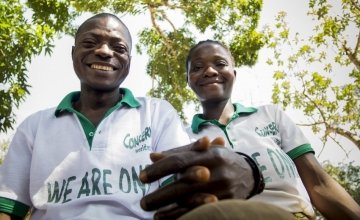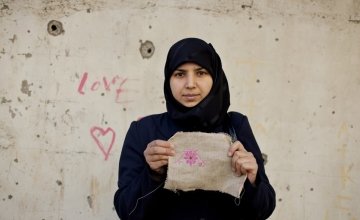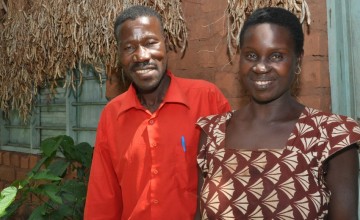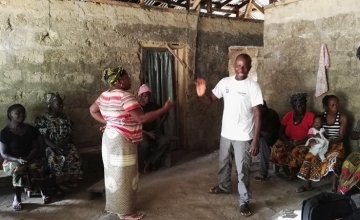
Read our 2024 annual report

Knowledge Hub
Let's talk about men on International Women's Day

Concern's Equality Advisor, Adèle Fox, takes a look at gender equality 107 years after we first marked International Women’s day, and examines the role of men in deconstructing gender inequalities.
Another year, another International Women’s Day. Marked since 1911 to remind us to take shared responsibility and collective action against gender inequality. 107 years on, and we’re still talking about gender equality? Unfortunately yes, we very much are. Just lately it has been brought into the Western limelight with the #MeToo and #TimesUp campaigns, and about time, too.
However, gender inequality pervades most countries in the world in one way or another, and much of this doesn’t ever make it into the news.
What’s the impact of gender inequality?
Gender inequality impacts most of us in a range of ways, though this impact will differ vastly based on our experiences, circumstances and contexts.
It affects the control we have over our bodies - whether or when we have sex, when and how many times we reproduce, whether we are put through a tradition of genital mutilation, how likely we are to experience gender-based violence (GBV), how ‘appropriately’ we are seen to be dressed. It affects whether we report such violations. According to Women Deliver, 37,000 girls are forced into early marriage every day, 30% of women have experienced some form of violence in their relationships, and 200 million girls and women alive today are affected by female genital mutilation. One in four women are abused during pregnancy.
Whether you’re a male or a female can have a direct effect on whether you will enrol in and complete school, experience sexual violence at school and be literate or not – 64% of the world’s illiterate adults are women.
Gender affects how much time you are expected to spend doing unpaid domestic chores or caring duties and how much access to land, finances and credit you are entitled to. Only 13% of landholders are women.
GBV, in its many forms, impacts physical, mental and reproductive health: injury, increased risk of miscarriage or stillbirth, lower self-esteem and confidence. Combined with decreased educational and employment opportunities, lack of decision-making power and discriminatory laws, the knock-on effects impact both the individual and society at large.
Gender inequality undermines our rights, impedes development and democracy building and compromises the livelihoods and freedom of millions. This is why we are still talking about it today, 107 years on.
Women’s empowerment

Recognising these inequalities, international development often focuses on empowering women. Income generation, savings and loans, vocational training, mother’s groups, promoting girls’ education are just some typical examples.
But many of the inequalities women face are actually created by harmful power dynamics, gender norms, cultures and deeply engrained beliefs and attitudes held by both men and women. Even when income, food production, health or school attendance are improved, equality in the outcomes we’re aiming for is not necessarily ensured. Women’s lack of decision-making power in the household, unequal division of labour, lower earnings, fewer land rights and violence against women and girls at home and at school continue.
So this begs the question, how much in terms of improved health, education, livelihoods – and ultimately reduced poverty – can really be achieved in the long run if we don’t recognise the limitations of targeting women only?
Why engage men?

The good news is that the roots of these inequalities are socially constructed. They are not inevitable, and they can be deconstructed.
By engaging the same people we work with on health, education and livelihoods and their partners in a gender transformative process, we can provide an opportunity for people to reflect on what gender norms and stereotypes mean to them and how this affects their behaviour and that of their community. It is a rare opportunity for both men and women to contemplate a different reality in terms of gender relations, one where roles and purposes in society don’t have to be assigned to only men or women and are not fixed. An opportunity to reflect on the impact of violence and the positive outcomes of doing things more equitably.
If we can begin a process to transform the way men and women think about gender equality, starting with themselves, we can achieve greater gains towards more equal division of labour, more equal opportunities, more equal decision-making power and less harmful norms and practices. We can create a more enabling environment from which women can empower themselves.
How has Concern engaged men?

Concern has implemented gender transformative processes in several countries over the last few years. Female programme participants in Tanzania stated, ‘the greatest barriers we face to improving our lives are our husbands’, so we engaged men as allies to women’s empowerment through 12 week sessions with couples. As a result, household chores were more equally shared while women’s decision-making power over household assets increased. In Lebanon, Syrian refugees and host families were engaged to improve coping mechanisms, reduce conflict and GBV, and promote men’s roles as caregivers and agents of change.
One participant said:
We started to know each other. Then we started to trust each other. We began to talk about family issues and ask each other’s opinions. The sessions went deeper and deeper. We began to shine a light on violence against women, and early marriage. In all of us, something changed 180 percent. A stone began to be lifted from our hearts. After these sessions, we could breathe again."
Strengthening our work to promote gender equality
We know this approach of bringing people together and offering a space to reflect, discuss and explore these sensitive issues is promising. And we are committed to building on this and learning from it. In Sierra Leone, we are undertaking research to assess the impact of engaging teachers and couples in gender transformational processes on the wellbeing and literacy outcomes of children. In Malawi, we are researching variations of the Graduation model to rigorously assess the difference engaging men makes to the outcomes.
As an organisation we are partnering with Sonke Gender Justice, a South African NGO specialising in gender equality, gender-based violence prevention and reducing the spread of HIV, to standardise and promote our gender transformational approach to ultimately improve our programming in development, fragile and emergency contexts.
It’s no magic bullet, but the gender transformative process sews a seed that can be cultivated for significant change in people’s lives. Hopefully then in 107 years’ time, the conversation about gender equality will have significantly moved on.
About the author
Adèle Fox is Concern’s Equality Advisor based in Dublin.
Learn more about Concern
Learn more about the diversity of our work across 26 countries


